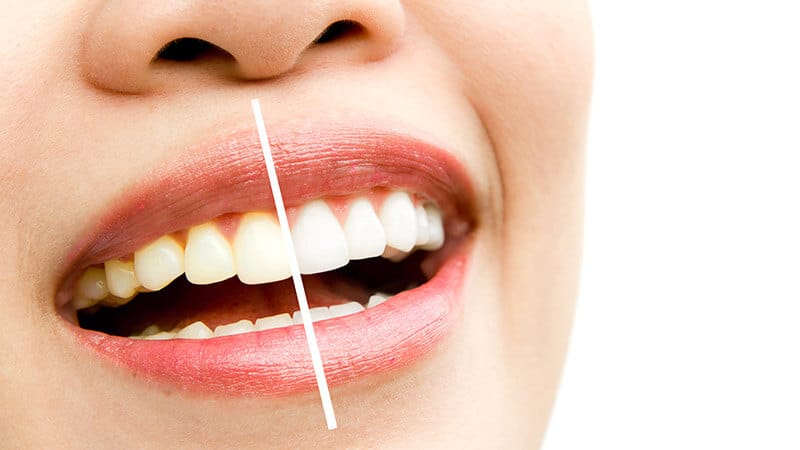A bright, white smile is often associated with health, confidence, and youthfulness, making teeth whitening a popular cosmetic dental treatment. With a variety of options available – from in-office procedures to at-home kits – people often wonder how long the results will last.
In this short guide, we take a look at the main options available, the likely length of time the results of each option will last, and the steps you can take to keep your smile brighter for longer.
Professional teeth whitening
In-office professional teeth whitening offers the most immediate and long-lasting results, with effects that can be noticeable for anywhere between six months and over two years. The longevity of the whitening largely depends on individual lifestyle factors, such as diet and oral hygiene habits, but the strength of the bleaching gels used during professional treatments tends to produce a more durable outcome compared to at-home options. This makes in-surgery whitening an ideal choice for patients seeking a safe, efficient, and highly effective way to improve their smile under the guidance of a dental professional.
At-home whitening kits
At-home whitening kits provided by a dentist offer a convenient and effective alternative to in-office treatments, with results that often last between six months and one year. These kits use custom-made trays and professional-grade whitening gels, allowing for more controlled and consistent application compared to over-the-counter products. While they may not deliver results as quickly as in-practice procedures, they provide patients with the flexibility to whiten their teeth at their own pace, all under the supervision of their dentist. With proper care and maintenance, including avoiding staining foods and practising good oral hygiene, the effects of at-home whitening can be significantly extended.
Over-the-counter products
Over-the-counter teeth whitening products, such as whitening strips, toothpastes, and gels, are widely accessible and often appealing due to their low cost and ease of use. However, the results they provide are generally less dramatic and shorter-lived, usually lasting just a few months. These products contain lower concentrations of bleaching agents compared to professional treatments, which limits their effectiveness – particularly for deeper or more stubborn stains. While they can offer a modest improvement in tooth colour, especially when used consistently, patients should be aware that the results are usually temporary and may require frequent reapplication. For those seeking more noticeable or longer-lasting whitening, professional options may offer better value and reliability in the long term.
Factors that affect the longevity of teeth whitening
The duration of teeth whitening results can vary significantly from person to person, largely depending on individual habits and lifestyle choices. Dietary factors play a key role – frequent consumption of staining substances such as coffee, tea, red wine, and strongly pigmented foods can cause discolouration to return quickly.
Smoking or using other tobacco products is another major contributor to staining and can significantly reduce the lifespan of whitening treatments. Additionally, maintaining good oral hygiene, including regular brushing, flossing, and professional cleanings, helps to preserve the effects of the treatment. The type of whitening treatment used also matters; professional in-practice procedures offer longer-lasting results compared to DIY products.
Tips to make your teeth whitening last longer
While no whitening treatment is permanent, there are several simple steps you can take to help maintain a brighter smile for as long as possible. Incorporating the following habits into your daily routine can significantly extend the effects of your whitening treatment:
- Use a straw for dark beverages – Drinking through a straw helps minimise direct contact between staining liquids like coffee, tea, or cola and your teeth.
- Rinse or brush after consuming staining foods – Promptly rinsing your mouth or brushing your teeth after eating foods such as berries, curry, or tomato sauce can reduce the risk of surface stains.
- Use whitening toothpaste once or twice a week – Whitening toothpaste can help remove surface stains and maintain brightness, but it should be used in moderation to avoid enamel wear.
- Avoid smoking and tobacco products – Tobacco is a major cause of tooth discolouration, so cutting it out can greatly enhance and prolong whitening results.
- Maintain regular dental hygiene – Brushing twice a day, flossing daily, and visiting your dentist for routine cleanings will support overall oral health and preserve your smile’s brightness.
Considering teeth whitening?
If you’re considering a longer-lasting teeth whitening treatment and you’re based in London or the South-East of the UK, book a consultation at Gallions Reach Dental Clinic. Conveniently located near Greenwich and a short bus ride from Abbey Wood Station on the Elizabeth Line, our experienced teeth whitening specialists are here to help you achieve a brighter, more confident smile with safe, effective, and professionally tailored solutions.
James qualified from Kings College London with honours in 2012 and completed his MJDFRCS diploma shortly after. He has since been working as a general dental practitioner in SE London and has completed further training at Kings College Hospital, where he also works as a specialty doctor in Paediatric Dentistry.



